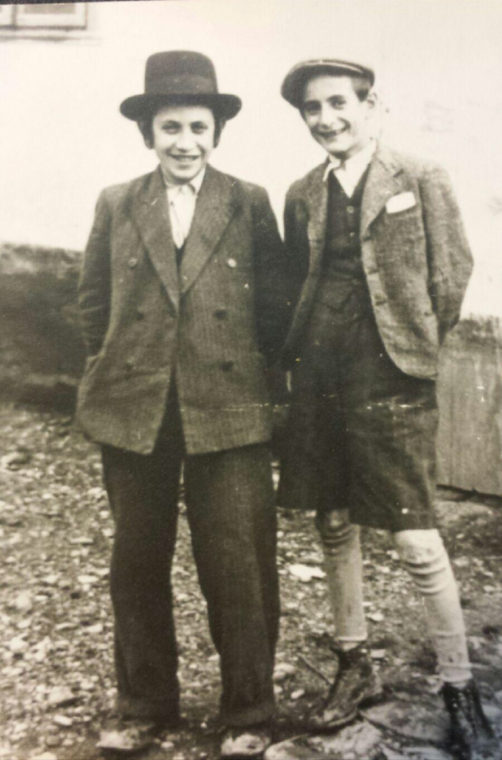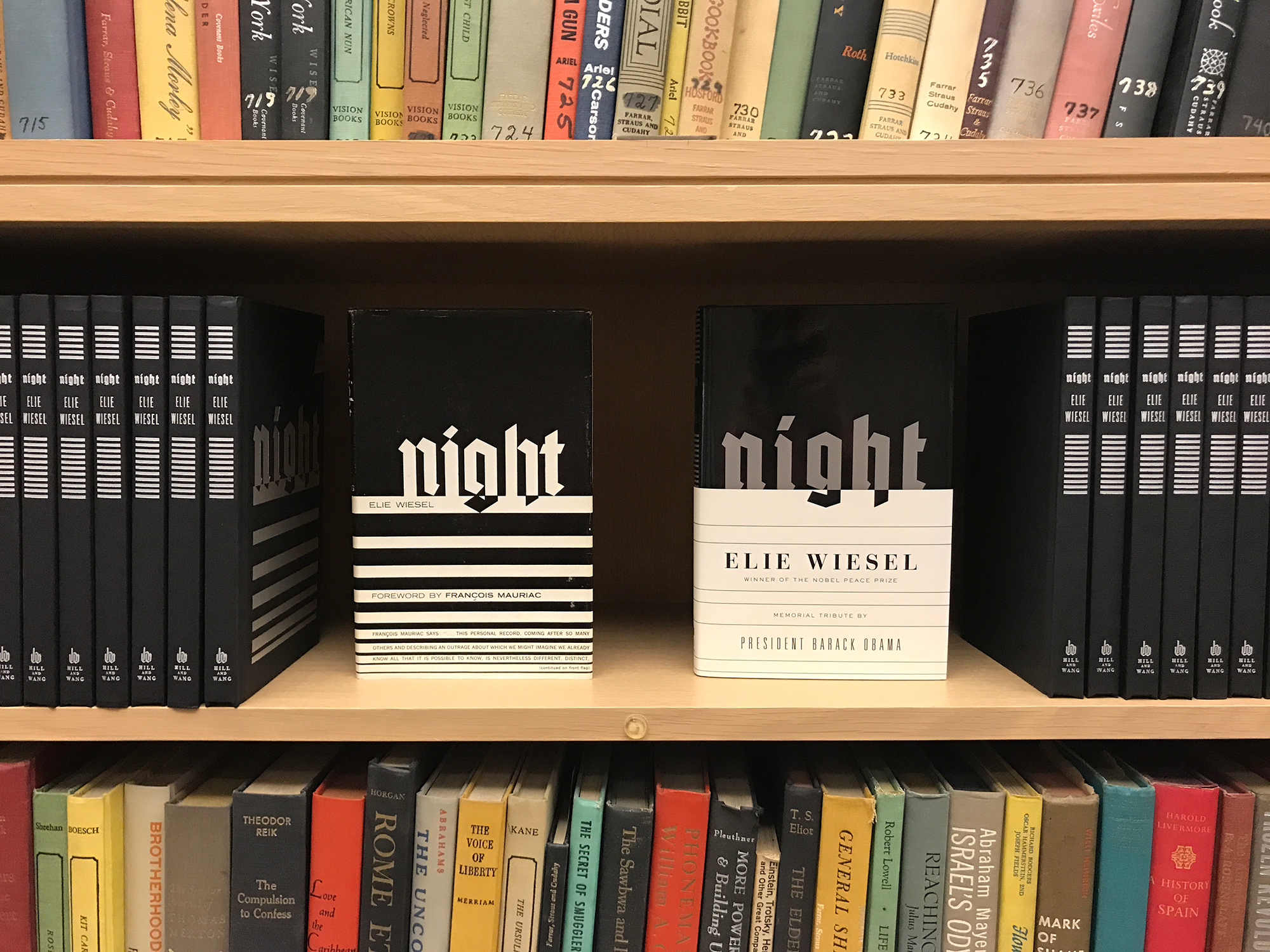At a glance, the two editions of Elie Wiesel’s Night are strikingly similar in appearance. Both are slim. Both are wrapped in black and white jackets with horizontal rules and emblazoned with the book’s title in type that mysteriously evokes a swastika. Yet the differences between the two editions are vast.
The first edition (above left) was published by Hill & Wang in 1960, long before I was a book editor. But for the perseverance of the young author’s equally young literary agent, Georges Borchardt, Night might never have found an American publisher. These were the post-war years, when America was all about optimism and prosperity. Prospective publishers dismissed Night, with its devastating insistence on memory, as morbid. Americans were not ready to read about the camps, where an innocent teenage boy was perversely made to feel responsible for the death of his father, and human beings were killed at genocidal whim. Eventually, Borchardt sent the manuscript to the publisher Arthur Wang, who boldly offered the young survivor a two hundred fifty-dollar advance. Could he have imagined that this book would go on to sell millions of copies worldwide? That its unknown author would someday win the Nobel Peace Prize? That a revered celebrity, Oprah Winfrey, would tell a massive television audience that Night was “required reading for all humanity”?
The second of the two editions, our Commemorative Edition (above right), publishes this month, a little more than a year after Elie’s death on July 2, 2016. Elie taught me a lot about memory in the thirty-five years since we had first worked together, and I will never forget the sadness and bewilderment of that July 4th weekend when he was laid to rest. Elie had survived the unthinkable– not only the physical and emotional ravages of “the Kingdom of Night,” but also being struck by a taxi on the streets of New York, and a terrifying attack by a Holocaust denier in San Francisco. It was hard to accept that he was gone.

Elie Wiesel (right) with his boyhood friend, Moshe Chaim Berkowitz, Sighet, Transylvania, circa 1937.
Curating the Commemorative Edition of Night was a way of holding Elie close in the painful weeks after his death. The puzzle of who should write the opening tribute, foreword, and afterword were preoccupations until all three elements fell into place. In the decades since Hill & Wang first published Night, not only had the world become ready to confront the Holocaust, but Elie had become an internationally known figure through his writing, teaching and humanitarian work.
Our commemorative Night opens with a memorial tribute by President Obama. These are the eloquent, deeply felt words of a friend. As Elie once told me, “Friendship is the greatest of all blessings.” Ambassador Samantha Power’s foreword, “The Inexorable Joyfulness of Elie Wiesel,” was first heard at the memorial held at the U. S. Holocaust Memorial Museum, which Elie had helped found. “If Atticus Finch and Scout are the fictional narrators who help shape our children’s moral universe,” said Power, “sixteen year-old Elie introduces our young to the hard facts of good, evil, and all that lies in between.” And an afterword, by Elie’s son, Elisha, resolves the volume as no one else could. Elisha and his young family are the future that eluded the Final Solution. Elisha writes poignantly about his search for the message his father alluded to in his last days.
Our Commemorative Edition also includes an unpublished address that Elie delivered at the U.N. on the 60th Anniversary of the Liberation of Auschwitz. In many ways, this speech, “Will the World Ever Learn?” is in conversation with Night, and also with our own very fraught times. This was in keeping with Elie’s mission. He wanted all of humanity to learn from his experience in the death camps. That is why he established the Elie Wiesel Foundation for Humanity with his wife and finest translator, Marion—whose translation appears in this edition. And why thousands of citizens of Norway lit the night sky with torchlight in December 1986, when Elie received the Nobel Peace Prize. Fire, used by the Nazis to burn books and incinerate babies, was transformed by these Norwegians into a symbol of tolerance and hope.
What Elie would have made of the recent torchlit demonstration in Charlottesville, where neo-Nazis and other white supremacists rampaged, one can only imagine. Elisha Wiesel reminds us that his father “saw this country through the eyes of a survivor rescued by U.S. servicemen, through the eyes of an immigrant who had nothing, who was given a state when he was stateless.” Tragically, Night has gained urgency as a cautionary tale in the brief period since its author’s death.
Ileene Smith is vice president and executive editor at Farrar, Straus and Giroux.
Elie Wiesel (1928–2016) is the author of more than sixty books. Night, first published in Yiddish in 1955, was selected for Oprah’s Book Club in 2006, and continues to be an important reminder of man’s capacity for evil. For his literary and human rights activities, he has received numerous awards, including the Presidential Medal of Freedom, the U.S. Congressional Gold Medal, and the National Humanities Medal. He received the Nobel Peace Prize in 1986.

